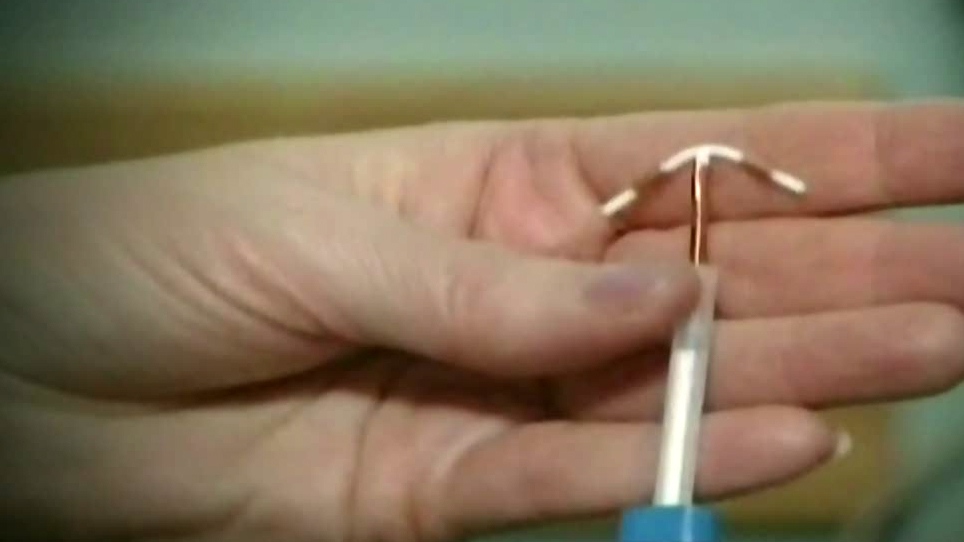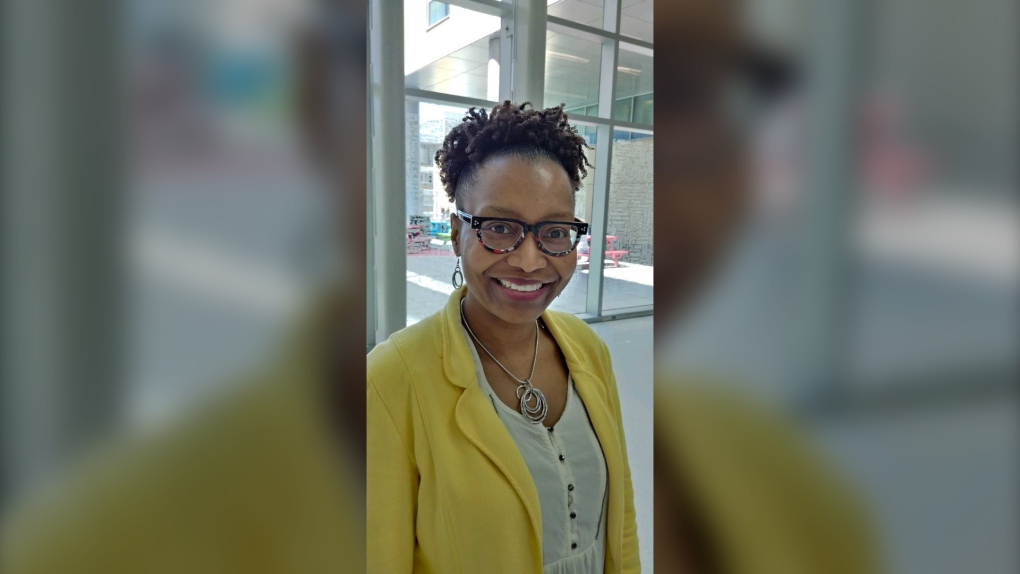Taking matters into their own hands: denied care, more Montreal women removing IUDs themselves
One Montreal woman who removed her contraceptive intrauterine device herself said it was far from her first choice.
In fact, Maude Plourde-Desjardins said, she tried to get an appointment at more than 15 health clinics, but all refused to provide her with the service.
"It’s not normal. I shouldn’t have to do that," she said, “but I felt desperate.”
She's not alone. The DIY approach to IUD removal has become more common, it seems, with some women even consulting online videos to help them accomplish the task.
The situation has prompted a leading obstetrician-gynecologist to issue a warning about the risks involved with the practice and to express frustration about the lack of access to care for women.
FIVE MONTHS OF FRUSTRATION AND PAIN
In September, Plourde-Desjardins called her family doctor, with some urgency, to ask her to remove the IUD that she’d had in place for three years.
“I asked her to take it out because I was experiencing pain during my period, but also outside of it,” she said.
The 26-year-old woman, who first told her story to La Presse, said she didn’t get the help and support she needed.
Instead, she said the doctor told her to call back after she chose a new method of birth control that met with her approval -- something other than condoms, the method Plourde-Desjardins had settled on.
"At first I was -- I’m not sure what you’re saying. You’re saying you're not going to remove it because the contraception I chose was not safe enough, in your opinion?" she recalled.
"I was frustrated, I was shocked, I didn’t understand why."
She said the doctor did order tests to investigate her health and the source of the pain, but when the results came back normal, still refused to remove the IUD and prescribed pain medication, a solution Plourde-Desjardins found unacceptable.
"No, absolutely not," she said. "If I have something inside my body that I can remove, I prefer to remove it [rather] than taking pills for the problem. [The IUD] is not something I need to survive."
CLINICS 'DON'T OFFER THE SERVICE'
Not willing to live with so much discomfort, Plourde-Desjardins began calling clinic after clinic in her Hochelaga-Maisonneuve neighbourhood and in other areas of Montreal to try and get help.
She was told "that they can’t take me because I'm not a patient there, or they don’t offer the service of taking out the IUD because of the pandemic," she said.
By late January, she’d contacted nearly 20 locations to no avail and was tired of living with the discomfort. She decided she would tackle the problem herself.

Her online research had led her to a variety of videos, some produced in the United States and some in Europe, that explained how a woman could, on her own, remove the tiny, flexible device that had been inserted in the uterus.
"It was easy, it wasn’t painful at all," Plourde-Desjardins said.
"Finding the string was a little more complicated," she added. "But once you have it, it came out really easily."
'PLEASE DON’T DO IT BY YOURSELF'
Obstetrician-gynecologist Dr. Martine Bernard and some of her colleagues were "shocked" to hear about Plourde-Desjardins’ plight and to learn that those self-help tutorials for IUD removal exist.
The specialist, who works at Maisonneuve-Rosemont Hospital, said she started asking her young patients about the “phenomenon” and learned that others were also struggling to get care.
She now wants to try and prevent others from taking the matter into their own hands.
"My message I can say to women who have the IUD inserted [is], 'Please don’t do it by yourself,'" she said.
"It’s not a benign act, it’s not a benign thing to do. There are risks. So it was really a big concern for us."
One of the doctor's worries is about introducing germs that can cause infection, but that's not all.
"You can harm yourself [as you] find the string -- it’s not easy to find it," she said.
"Sterility, it’s not always sterile, so you can have an infection," said Bernard, who is also secretary at the Association of Obstetricians and Gynecologists of Quebec (AOGQ).
 Dr. Martine Bernard
Dr. Martine Bernard
She urged women to knock on as many doors as they can to try and find a professional to help them with the issue. She also decried the lack of access to women's health care.
"I hear about so many things we can do for women’s health. This thing is so basic, so simple, just to have access…we have to work on it, not only the specialists but the first [line] care," she said.
Bernard notes an IUD can safely remain in a woman’s body for five or ten years depending on the type inserted, but they do have an expiration date. That means it's doctors' responsibility to be available for the removal, she said.
"If you put something in a woman’s body you have to offer... a service après-vente, a service after sale," she said, that includes information about how and when to get the IUD removed.
She also said it’s equally important to see either an obstetrician-gynecologist, a family doctor or a nurse practitioner to remove the IUD, so they can discuss other pregnancy-prevention options with the patient.
As for the family doctor who refused Plourde-Desjardins services because the woman wanted to rely on condoms instead, Bernard said "there is no place in medicine to think this way anymore, that’s for sure," calling it “maternalistic.”
"You can give all the information, you can give your advice, but in the end, the decision is the woman’s decision, it’s not yours," Bernard said.
GYNECOLOGY ACCESS AFFECTED BY PANDEMIC: MINISTRY
The AOGQ now plans to investigate further to see if the problem is occurring primarily in Montreal, or also in other regions of the province.
A health ministry spokesperson told CTV News in an email that access to gynecological services related to contraception was affected by the pandemic.
"There was a backlog of requests for consultations in specialized services in all sectors," Marjorie Larouche wrote.
"With the support of the MSSS, the gynecology teams are working to make up for the delays," in collaboration with the rest of the health network.
Larouche emphasized the ministry does not recommend women remove an IUD themselves, because "the risk of injury is significant."
Plourde-Desjardins agrees it’s "really preferable to do it with a professional," and wishes she didn’t have to go through all that "worrying, and feeling really alone," she said.
CTVNews.ca Top Stories

Indian envoy warns of 'big red line,' days after charges laid in Nijjar case
India's envoy to Canada insists relations between the two countries are positive overall, despite what he describes as 'a lot of noise.'
Stormy Daniels describes meeting Trump during occasionally graphic testimony in hush money trial
With Donald Trump sitting just feet away, Stormy Daniels testified Tuesday at the former president's hush money trial about a sexual encounter the porn actor says they had in 2006 that resulted in her being paid to keep silent during the presidential race 10 years later.
U.S. paused bomb shipment to Israel to signal concerns over Rafah invasion, official says
The U.S. paused a shipment of bombs to Israel last week over concerns that Israel was approaching a decision on launching a full-scale assault on the southern Gaza city of Rafah against the wishes of the U.S.
Former homicide detective explains how police will investigate shooting outside Drake's Bridle Path mansion
Footage from dozens of security cameras in the area of Drake’s Bridle Path mansion could be the key to identifying the suspect responsible for shooting and seriously injuring a security guard outside the rapper’s sprawling home early Tuesday morning, a former Toronto homicide detective says.
Northern Ont. woman makes 'eggstraordinary' find
A chicken farmer near Mattawa made an 'eggstraordinary' find Friday morning when she discovered one of her hens laid an egg close to three times the size of an average large chicken egg.
Susan Buckner, who played spirited cheerleader Patty Simcox in 'Grease,' dead at 72
Susan Buckner, best known for playing peppy Rydell High School cheerleader Patty Simcox in the 1978 classic movie musical 'Grease,' has died. She was 72.
Jeremy Skibicki has 'uphill battle' to prove he's not criminally responsible in Winnipeg killings: legal analysts
Accused killer Jeremy Skibicki could have a challenging time convincing a judge that he is not criminally responsible for the deaths of four Indigenous women, a legal analyst says.
Bye-bye bag fee: Calgary repeals single-use bylaw
A Calgary bylaw requiring businesses to charge a minimum bag fee and only provide single-use items when requested has officially been tossed.
Alcohol believed to be a factor in boating incident after 2 men die: N.S. RCMP
Two Nova Scotia men are dead after a boat they were travelling in sank in the Annapolis River in Granville Centre, N.S., on Monday.
































